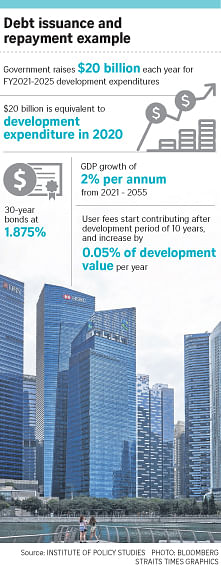SINGAPORE -Two researchers from the Institute of Policy Studies (IPS) have proposed that the Government issue 30-year bonds to borrow $20 billion each year for the next five years to finance public spending that benefits future generations.
This will not only create extra fiscal space, but the debt can also be spent and paid back in a manner that is equitable across generations, as the Covid-19 pandemic strains state coffers and social spending rises with an ageing population, they said.
The researchers noted that $20 billion is roughly equivalent to projected development expenditures in last year's annual budget. The Singapore Government Securities (SGS) bonds issued will pay a fixed coupon of 1.875 per cent "for which there is strong demand in the market".
Their proposed debt issuance framework is the subject of a working paper on public debt and inter-generational equity in Singapore released on Tuesday (Feb 9).
The paper, written by IPS head of governance and economy Christopher Gee and research associate Kunal Pawa, suggests that public debt be raised exclusively for development expenditures.
These are typically capital investments under each ministry's budget which are not large-scale or long-term investments such as infrastructure. An example the paper cited is the new building for the National Cancer Centre Singapore.
Such non-infrastructural capital expenditures can generate positive social returns, said Mr Gee and Mr Pawa: "Further, with long useful lives, these investments can have direct and indirect benefits to future generations."
The Government is required by the Constitution to keep a balanced budget over each term of office. It does not borrow to fund recurrent spending, but to finance large-scale public infrastructure.
In Budget 2019, Deputy Prime Minister and Finance Minister Heng Swee Keat said the Government will partly fund major infrastructure projects such as the Cross Island Line through borrowing.
"For these large and lumpy expenditures where the benefits span many generations of Singaporeans, paying for them through some borrowing is fairer and more efficient," he said, adding that recurrent expenditures in areas such as healthcare, pre-school education and security will be funded by recurrent revenues such as the goods and services tax (GST).
Mr Gee and Mr Pawa said the debt issued may be serviced with a combination of user fees and taxes.
This ensures that those who most directly benefit from the developments contribute to debt repayment, and the debt does not roll over and unfairly burden future generations, they said.
They observed that the resulting tax burden - between $3.5 billion and $4.5 billion each year - would be smaller than having development expenditures financed by current tax revenues. "This gives the Government additional fiscal space to continue to invest and pursue expansionary policy for the country as it recovers from the pandemic."
They gave several reasons why the Government can - and should - adopt a more holistic approach towards public debt and overall fiscal management- one which takes into account not only inter-generational benefits, but also values such as equality, welfare and reciprocity.
First, given Singapore's unique position of fiscal strength, it can issue and manage public debt while being responsible to future generations.
Second, it is difficult to accurately determine the benefit or welfare improvement to each generation, and across different types of expenditure. Different generations also have different preferences, they said.
Third, public expenditure can be expected to go up given rising healthcare costs and efforts to secure jobs and prepare Singaporeans for digital transformation. The 2 percentage point hike in GST is also not slated to take place until between 2022 and 2025.
Fourth, sustained low interest rates mean that the inter-generational costs of public debt can be kept low.
"There may be no inter-generational welfare costs if public investment funded by public debt earns a greater social return than its opportunity cost," they explained.
In a media briefing on Tuesday, Mr Gee and Mr Pawa stressed that their proposal seeks to ensure that debt does not accumulate.
Mr Gee said: "It is founded on the principle of inter-generational equity - a disciplined framework for issuing debt, so that we don't end up in a situation where we accumulate tonnes of debt."
Mr Pawa added: "What it does show is that considerable fiscal space can be created by issuing debt. Funding is only for development expenditures that have long-term inter-generational benefits, so that we retain this very strong foundation of fiscal prudence."
-
A paper by two Institute of Policy Studies (IPS) researchers highlights four principles of inter-generational equity relevant to Singapore's fiscal management of reserves, and why the relationship between public debt and inter-generational equity is not straightforward:
1. Sufficientarian principle
Each generation's obligation is to provide a minimum threshold of resources enough for the basic needs or liberties of the next generation.
2. Inter-generational equity
Each generation's obligations are to ensure every generation achieves equality within its respective generation.
3. Reciprocity principle
The current generation has an obligation to return to the next generation what it received from the previous generation.
4. Benefit principle
Each generation should pay for what it benefits from, and not pay for what it does not benefit from ("benefiter-pays"). Future generations should not have to pay, through taxation, for social spending that benefits present generations.
From these principles, said the paper, it can be inferred that the Government's current position on public debt follows the benefit principle.
This is because borrowing is only permitted for long-term infrastructure investments which have benefits across generations, while recurrent spending needs such as healthcare and education must be funded by recurrent revenue streams such as taxes.
But relying on the benefit principle alone is problematic, as all forms of expenditure can have inter-generational benefits, said IPS researchers Christopher Gee and Kunal Pawa.
They noted that some forms of current expenditure, such as education and healthcare, develop human, social and cultural capital which indirectly benefit future generations.
Non-infrastructural capital expenditure such as the National Cancer Centre Singapore can also have direct and indirect benefits to future generations.
The relationship between debt and inter-generational equity is not straightforward or simple, they added.
If the Government were to now issue debt to finance consumption vouchers as a fiscal stimulus to the Covid-19 crisis, it would violate the principle of reciprocity, because current generations would be acting against the sacrifices of past generations.
"At the same time, however, if the Government issues debt to finance a programme in unemployment insurance, it could improve inter-generational equality," they said.
"Children of unemployed parents have a greater chance of social mobility if their parents are supported by a government-provisioned unemployment insurance programme."
They conclude that debt financing of public expenditure and its consequence on inter-generational equity in Singapore are not just a matter of which generation benefits. It must also consider the implications of expenditures on reciprocity, equality and welfare.



